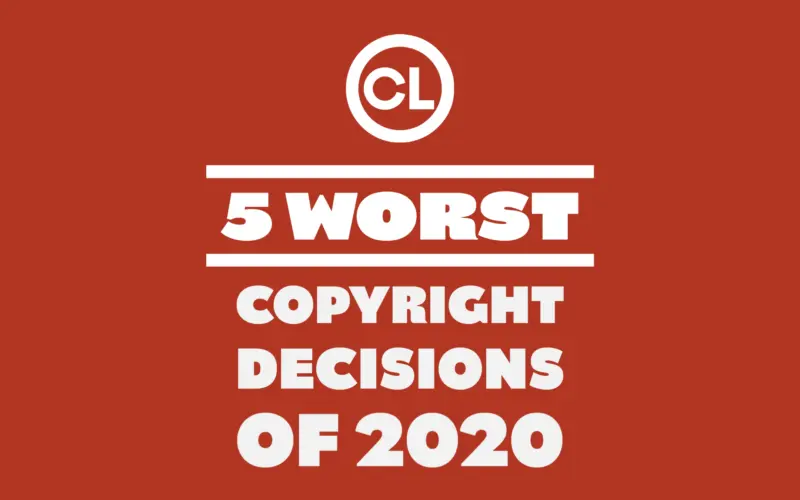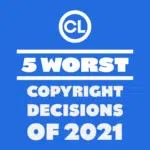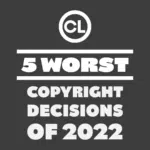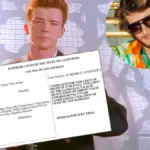Remembering a lousy year with a countdown of the lousiest copyright rulings of 2020.
There’s no shortage of “best of” lists this time of year. But let’s face it: pigs don’t look good in lipstick. So as we get ready to finally close the books on 2020, here are my picks for the most wrongly-decided copyright opinions of the past year.
5. Alfred v. Walt Disney Company
In July’s Alfred v. Walt Disney Company, a Ninth Circuit panel revived a lawsuit alleging that Disney’s “Pirates of the Caribbean” film franchise infringed the plaintiff’s screenplay for a movie adaptation of the Disney ride. Among the alleged similarities were main characters introduced “during a battle at gunpoint” and “treasure stories that take place on islands and in jewel-filled caves.”
Notwithstanding the generic nature of the alleged similarities, the panel held that the district court acted too early in comparing the works and dismissing the case. Instead, the panel suggested that the question of substantial similarity would be assisted by “additional evidence” following discovery, and that expert testimony “would be particularly useful” in determining the extent to which the plaintiff’s claimed similarities were in fact “pirate-movie tropes.”

The result is the prospect of expensive litigation to dispose of even facially weak claims, as well as an intra-circuit split on the propriety of pleading stage dismissals in copyright infringement cases involving literary works. While Alfred is technically “unpublished,” it’s already causing confusion (not to mention increased legal bills) in lower courts, as litigants and judges try to make sense of the Ninth Circuit’s recent inconsistent rulings on this topic.
4. Huffman v. Activision Publishing, Inc.
Huffman v. Activision is a summary judgment ruling out of the Eastern District of Texas decided in December. The plaintiff is professional wrestler Booker T. Huffman, aka “Booker T,” aka “G.I. Bro.” His lawsuit claims that defendant Activision Blizzard infringed a single depiction of the G.I. Bro character on a marketing poster for the video game “Call of Duty: Black Ops 4.”

It’s a strange opinion. The court’s copyright analysis focused almost exclusively on whether the plaintiff had shown enough evidence of access and/or similarities probative of copying for the case to go to a jury. But the court totally ignored that copying is only legally actionable if the defendant’s work is substantially similar to protected elements contained in the plaintiff’s work. In other words, the mere fact that a work has been copied as a “factual” matter isn’t enough in the absence of substantial similarity of protected expression.
Back in 2004, the Fifth Circuit counseled that “[i]n order to avoid confusion, a district court should explain that .… the probative similarity inquiry” is “not the same as the question of substantial similarity, which dictates whether the factual copying, once established, is legally actionable.” The court in the Huffman case didn’t take that advice at all. This now results in the case going to a jury in the plaintiff-friendly Eastern District of Texas, even though the only real similarities between the two works (military men with dreadlocks holding weapons in a standard military pose) aren’t subject to copyright protection.
3. Tom Hussey Photography v. BDG Media
At issue in Tom Hussey Photography v. BDG Media was whether a company may be liable for copyright infringement by purchasing a website and continuing to host allegedly infringing content contained on the site. BDG (operator of Bustle and other lifestyle sites) purchased Flavorwire.com in 2018, which it continued to operate and manage after the asset acquisition. Among the articles on the Flavorwire site was one that displayed copies of nine photographs owned by the plaintiff. After discovering the photos, the plaintiff repeatedly requested that BDG remove them from Flavorwire. BDG didn’t respond, prompting the copyright lawsuit.
BDG mounted an interesting defense, arguing that because it had nothing to do with Flavorwire’s initial display of the images (which occurred prior to BDG’s acquisition of the site), it didn’t commit a “volitional act” and therefore couldn’t be held liable for infringement. Volitional conduct is basically another way of asking whether a defendant “caused” the copyright infringement to occur. This is a defense typically employed (successfully) by internet service providers who passively host infringing works uploaded by third party users.

While the defendants’ lawyers successfully convinced the court, the BDG ruling creates the prospect of website operators engaging in “shell game” transactions to avoid liability. By immunizing the only entity in control of the server (which BDG continued to actively operate and manage), the court not only took away any incentive for BDG to remove infringing content from its site, it may have created a blueprint for liability-free infringement.
As Andrew Russell wrote in his blog post about the case, taking the case to its logical conclusion, “A could make a perfect copy of everything on the New York Times’ website” and sell it to Company B, which “could then sell access to that content in perpetuity and compete with nytimes.com itself,” without concern of copyright infringement. This seems like the wrong result.
2. Bertucelli v. Universal City Studios
If you’re a basketball fan, you’re probably familiar with the “King Cake Baby.” This oversized walking head freakshow is the mascot of the New Orleans Pelicans (which makes it the second creepiest sports mascot west of this guy). The creators of the artwork brought a lawsuit alleging that a cartoonish baby face mask featured in Universal’s “Happy Death Day” and its sequel infringed their copyright in King Cake Baby.


In denying the defendants’ motion for summary judgment, the court in Bertucelli v. Universal City Studios conducted a side-by-side comparison of the parties’ respective baby faces and found that there was enough evidence of substantial similarity to send the case to trial. Absent from the court’s October ruling is any attempt to distinguish between protectable and unprotectable elements of the works, thereby potentially allowing a jury to find copyright infringement based on natural anatomical features or other generic elements dictated by the works’ similar subject matter. Trial is currently scheduled for April 19, 2021. If the plaintiff ends up prevailing, perhaps the cigar-chomping Baby Herman from “Who Framed Roger Rabbit” will want to have a few words with King Cake Baby.

1. Alexander v. Take-Two Interactive
Back in October, I wrote an article on Copyright Lately lamenting the court’s decision in Alexander v. Take-Two Interactive Software, a completely misguided tattoo copyright ruling out of the Southern District of Illinois. Plaintiff Catherine Alexander is a former tattoo artist who inked pro wrestler Randy Orton several times between 2002 and 2008. As part of his wrestling deal, Orton licensed the right to use his name and likeness to WWE. WWE then sublicensed those name and likeness rights, along with those of other wrestlers, to Take-Two Interactive, publisher of the popular “WWE 2K” video games. Orton’s tattoos, which are a part of the wrestler’s identity, were included in order to present a realistic depiction of Orton in the defendants’ games.

The court’s opinion rejected all of Take-Two’s arguments on summary judgment, sending the case to a jury trial that’s currently scheduled for February 2021. By refusing to dismiss the case, the court has effectively ruled that anyone with a tattoo is not in control of the uses to which his or her likeness is put. Under the decision, unless you expressly negotiate the terms of a license with your tattoo artist up front, there’s nothing to stop the artist from objecting later to a license she doesn’t approve.
Taken to its logical conclusion, the legal arguments accepted by the court in Alexander would prevent the realistic depiction of a tattooed individual in expressive works—not only in video games, but motion pictures and even photos posted on social media—unless a jury finds that a particular use was “fair.” That should be a troubling thought, whether or not you have a tattoo. Read more about Alexander, my pick for the worst copyright ruling of 2020, here.
Honorable Mention: Sinclair v. Ziff-Davis, LLC
In April, the Southern District of New York dismissed a copyright infringement lawsuit filed by photographer Stephanie Sinclair against web site Mashable. The court found that based on Instagram’s terms of service, Sinclair had given Instagram a license to use her publicly-posted photos, and that Instagram had in turn given Mashable a sublicense to embed these photos in an article on its site featuring Sinclair.

But then, in June, Instagram threw a wrench into the works. In a bombshell statement to Ars Technica, the site advised that it is has not in fact granted a sublicense to sites that embed Instagram content—even though it has the legal right to do so. James Grimmelmann, Professor of Digital and Information Law at Cornell, predicted that Instagram’s statement was “going to blow up the Sinclair case.” He was right. Just three weeks later, the court granted Sinclair’s motion for reconsideration. Revisiting its April ruling, the court held that Instagram’s terms of use were “insufficiently clear” to warrant dismissal of Sinclair’s claims at the pleading stage of the litigation.
The Sinclair decision (as well McGucken v Newsweek, which reached a similar result), has caused intense confusion about the legality of embedding, upsetting long settled expectations not only among digital journalists, but millions of everyday Instagram users as well. That said, Sinclair gets an honorable mention in my list because the root of the confusion is primarily Instagram itself as opposed to the court. There’s a lot more to be said about the legality of embedding, and you should check out my article “Is it Legal to Embed Public Instagram Photos on Your Website?” if you’re interested (you are interested right?)
SO . . . . Am I totally off base? Any other cases you think should have made the list? Let me know in the comments below or on the Copyright Lately social media accounts. In the meantime, in the immortal words of countdown icon Casey Kasem, keep your feet on the ground and keep reaching for the stars in 2021!







2 comments
Regarding King Cake Baby — why stop (or start) with Baby Herman? The Kewpies were a multi-media sensation after the debut of Rose O’Neill’s comic strip in 1909. They, in turn, were inspired by Renaissance cherubs . If the courts embrace quarantining outside the cultural stream, DC Comics could lay claim to the images in the Wonder Tot comic story “Terror in Toyland” and other Super Jrs. tales from the 1980s. This is a dangerous development indeed.
More nightmares! Thanks Jeff.
https://www.worthpoint.com/worthopedia/kewpie-face-mask-rose-neill-kewpies-460958513